Current Trauma Faculty and Research Activities
 Seema Anandalwar is an Assistant Professor in the Division of Traumatology, Surgical Critical Care, and Emergency Surgery. She completed her general surgery residency at Beth Israel Deaconess Medical Center and her trauma and surgical critical care fellowship at the University of Maryland Shock Trauma Center. She holds a master's degree in clinical effectiveness.
Seema Anandalwar is an Assistant Professor in the Division of Traumatology, Surgical Critical Care, and Emergency Surgery. She completed her general surgery residency at Beth Israel Deaconess Medical Center and her trauma and surgical critical care fellowship at the University of Maryland Shock Trauma Center. She holds a master's degree in clinical effectiveness.
Her research interests focus on trauma resuscitation strategies, the mechanisms and clinical impact of trauma-induced coagulopathy, and optimization of care for critically ill and injured patients. Her work spans translational investigations, observational and interventional clinical research, and participation in multicenter and industry-sponsored clinical trials. Through this integrated approach, she aims to bridge bench-to-bedside gaps and advance evidence-based innovations in trauma and surgical critical care.
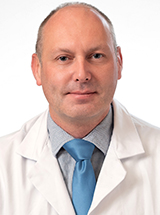 Dr. Gary Alan Bass currently serves as an Assistant Professor of Surgery at the University of Pennsylvania, and as an Attending Surgeon and Intensivist at the Hospital of the University of Pennsylvania, Penn Presbyterian Medical Center, Pennsylvania Hospital and GrandView Hospital.
Dr. Gary Alan Bass currently serves as an Assistant Professor of Surgery at the University of Pennsylvania, and as an Attending Surgeon and Intensivist at the Hospital of the University of Pennsylvania, Penn Presbyterian Medical Center, Pennsylvania Hospital and GrandView Hospital.
Dr. Bass brings a wealth of experience and academic rigor to his practice and teaching. His extensive educational background includes an MD from the Royal College of Surgeons in Ireland, a BSc and MSc in Physiology from University College Dublin, an eMBA from Quantic School of Business, a Certificate in Clinical Epidemiology and Biostatistics from the University of Pennsylvania and a recent PhD in Surgical Sciences from Örebro University, Sweden. Following residency training in general surgery at the Royal College of Surgeons in Ireland, Dr Bass undertook fellowship training first in Surgical Critical Care and then Trauma and Acute Care Surgery at the University of Pennsylvania.
In addition to his clinical and teaching roles, Dr. Bass is deeply involved in research and professional society leadership. At Penn, he is a Senior Scholar at the Center for Perioperative Outcomes Research and Transformation (CPORT) at the University of Pennsylvania. Nationally, he is a member of the Multicenter Trials committee of the American Association for the Surgery of Trauma, member of the Adult Comprehensive Critical Care Education Committee and the Gamification Taskforce of the Society of Critical Care Medicine. His contributions to the field are recognized internationally, with roles such as Examiner for the European Board of Surgery, the inaugural Chair of the Research Committee for the European Society for Trauma and Emergency Surgery (ESTES), Honorary Fellowship of the Serbian Society of Emergency Surgery and adjunct appointment to the Institute for Global Surgery at the Royal College of Surgeons in Ireland.
Dr. Bass’s research portfolio is both diverse and impactful, focusing on improving outcomes in trauma and emergency surgery through innovative methodologies and multidisciplinary collaboration. He has authored 7 book chapters, 100 papers, and 40 invited lectures or conference presentations. His work has been cited over 4500 times (h-index = 25). His work on the snapshot audit methodology has provided a framework for prospective observational cohort studies in surgery, emphasizing the importance of real-time granular patient-level data collection and analysis. Dr. Bass has also made significant contributions to understanding the management of esophageal and colorectal cancers, with studies demonstrating the impact of emergency presentations on patient prognosis and the benefits of chemoradiotherapy in esophageal cancer. His dedication to advancing surgical science is evident in his numerous publications, which continue to influence clinical practices and policymaking on a global scale.
 Dr. Jeremy Cannon is Professor of Surgery in the Division of Traumatology, Surgical Critical Care & Emergency Surgery. He serves as Co-Director of the Penn Acute Research Collaboration (PARC), a multi-disciplinary and multispecialty collaborative that promotes interdepartmental translational research at Penn Presbyterian Medical Center. PARC brings together Penn investigators from wide range of disciplines including Trauma, Critical Care, Emergency Medicine, Neurosurgery, Neuro-Critical Care, and Orthopedic Surgery to support urgent and emergent clinical trial patient enrollment. Dr. Cannon also serves as Surgeon Champion for the Penn Medicine-US Navy Trauma Program Partnership. In this role, Dr. Cannon applies his own battlefield experiences as a Trauma Surgeon in Iraq and Afghanistan along with his engineering background to examine three broad fields: early identification and management of hemorrhagic shock, improved management of thoracic trauma, and military-civilian trauma team collaboration.
Dr. Jeremy Cannon is Professor of Surgery in the Division of Traumatology, Surgical Critical Care & Emergency Surgery. He serves as Co-Director of the Penn Acute Research Collaboration (PARC), a multi-disciplinary and multispecialty collaborative that promotes interdepartmental translational research at Penn Presbyterian Medical Center. PARC brings together Penn investigators from wide range of disciplines including Trauma, Critical Care, Emergency Medicine, Neurosurgery, Neuro-Critical Care, and Orthopedic Surgery to support urgent and emergent clinical trial patient enrollment. Dr. Cannon also serves as Surgeon Champion for the Penn Medicine-US Navy Trauma Program Partnership. In this role, Dr. Cannon applies his own battlefield experiences as a Trauma Surgeon in Iraq and Afghanistan along with his engineering background to examine three broad fields: early identification and management of hemorrhagic shock, improved management of thoracic trauma, and military-civilian trauma team collaboration.
Hemorrhagic Shock
As the leading cause of potentially preventable death in trauma patients, hemorrhagic shock represents an optimal condition for research innovation. Dr. Cannon leads multiple efforts addressing different aspects of this challenging problem from using machine learning and artificial intelligence to facilitate early recognition to nudge protocols to optimize patient resuscitation. Exception from informed consent (EFIC) trials conducted at Penn Presbyterian Medical Center for these patients include (1) the Trauma and PCC (TAP) trial evaluating the role of early prothrombin complex concentrate (PCC) agents to improve hemostasis in these patients and (2) the Trauma Resuscitation with Group O Whole Blood or Products (TROOP) trial comparing massive transfusion protocols using whole blood vs standard component therapy protocols.
Thoracic Trauma
Acute hemothorax (HTX) and hemo-pneumothorax (HTX-PTX) commonly occur after trauma, yet treatments for this condition remain surprisingly ineffective with a high rate of failure requiring further intervention or re-intervention. Efforts to address this challenge include quantifying the epidemiology of this problem and then addressing the most common causes for initial treatment failure.
Military-Civilian Collaboration
Battlefield trauma care strongly resembles the care we provide in our civilian trauma bay every day. Thus, we have an opportunity to provide military teams education and training to ensure those wounded in combat will benefit from the most advance care possible delivered by trauma experts. Research efforts to support this training include team resuscitation assessments using enhanced video capture.
 Alison Haruta, MD is an Assistant Professor of Surgery in the Division of Traumatology, Surgical Critical Care, and Emergency Surgery at the University of Pennsylvania. She is board-certified in General Surgery, Surgical Critical Care, and Hospice and Palliative Medicine. She is active in national surgical societies and serves on the AAST Palliative Care Committee. Her research and scholarly work center on finding novel ways to integrate palliative care into the routine care of surgical patients and teaching effective communication skills to surgeons. She has authored national curricula for the ACS Resident Prep program and the Aquifer medical student palliative care modules, created multiple simulation-based training programs for residents and paramedics, and served as an instructor for medical students in their transition-to-residency and surgical competencies courses. Along with her colleagues at the University of Washington, she developed a series of surgical palliative care–focused episodes on the “Behind the Knife” podcast. She hopes to continue to demonstrate the value of utilizing palliative care alongside life sustaining care and is working to integrate more communication focused simulations into the surgical education curriculum.
Alison Haruta, MD is an Assistant Professor of Surgery in the Division of Traumatology, Surgical Critical Care, and Emergency Surgery at the University of Pennsylvania. She is board-certified in General Surgery, Surgical Critical Care, and Hospice and Palliative Medicine. She is active in national surgical societies and serves on the AAST Palliative Care Committee. Her research and scholarly work center on finding novel ways to integrate palliative care into the routine care of surgical patients and teaching effective communication skills to surgeons. She has authored national curricula for the ACS Resident Prep program and the Aquifer medical student palliative care modules, created multiple simulation-based training programs for residents and paramedics, and served as an instructor for medical students in their transition-to-residency and surgical competencies courses. Along with her colleagues at the University of Washington, she developed a series of surgical palliative care–focused episodes on the “Behind the Knife” podcast. She hopes to continue to demonstrate the value of utilizing palliative care alongside life sustaining care and is working to integrate more communication focused simulations into the surgical education curriculum.
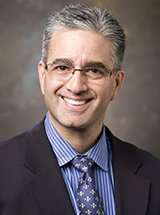 Lewis J. Kaplan MD, FACS, FCCP, FCCM is Professor of Surgery at the Perelman School of Medicine, University of Pennsylvania. He is Section Chief of Surgical Critical Care and Director of Surgical Intensive Care services at the Corporal Michael J. Crescenz VA Medical Center in Philadelphia, PA. Dr. Kaplan serves in several professional societies in leadership roles and was the 2020 president of the Society of Critical Care Medicine. He sits on multiple editorial boards including Critical Care Medicine, Surgical Infections, and Injury and reviews for a host of others. He is an Associate Editor for Critical Care Explorations as well. With more than 100 peer-reviewed publications, Dr. Kaplan's research interests span models of critical care, unmeasured ion impact in acid-base balance, acute kidney injury, surgical infection, transfusion medicien, Airway Pressure Release Ventilation, and Tactical Emergency Medical Services.
Lewis J. Kaplan MD, FACS, FCCP, FCCM is Professor of Surgery at the Perelman School of Medicine, University of Pennsylvania. He is Section Chief of Surgical Critical Care and Director of Surgical Intensive Care services at the Corporal Michael J. Crescenz VA Medical Center in Philadelphia, PA. Dr. Kaplan serves in several professional societies in leadership roles and was the 2020 president of the Society of Critical Care Medicine. He sits on multiple editorial boards including Critical Care Medicine, Surgical Infections, and Injury and reviews for a host of others. He is an Associate Editor for Critical Care Explorations as well. With more than 100 peer-reviewed publications, Dr. Kaplan's research interests span models of critical care, unmeasured ion impact in acid-base balance, acute kidney injury, surgical infection, transfusion medicien, Airway Pressure Release Ventilation, and Tactical Emergency Medical Services.
 Dr. Elinore Kaufman is Assistant Professor of Surgery in the Division of Traumatology, Surgical Critical Care, and Emergency Surgery. She serves as Research Director for the division, and as Medical Director for the Penn Trauma Violence Recovery Program, a hospital-based violence intervention program. She is a Senior Scholar at the Leonard Davis Institute of Health Economics and the Penn Injury Science Center, for which she serves as content lead for firearm injury. Dr. Kaufman holds an MD from Harvard and a Master of Science in Health Policy from the University of Pennsylvania. She completed her residency in general surgery at New York-Presbyterian Weill Cornell Medical Center and her fellowship in surgical critical care and trauma surgery at the University of Pennsylvania. She joined the faculty in the division of Traumatology, Surgical Critical Care, and Emergency Surgery in 2020.
Dr. Elinore Kaufman is Assistant Professor of Surgery in the Division of Traumatology, Surgical Critical Care, and Emergency Surgery. She serves as Research Director for the division, and as Medical Director for the Penn Trauma Violence Recovery Program, a hospital-based violence intervention program. She is a Senior Scholar at the Leonard Davis Institute of Health Economics and the Penn Injury Science Center, for which she serves as content lead for firearm injury. Dr. Kaufman holds an MD from Harvard and a Master of Science in Health Policy from the University of Pennsylvania. She completed her residency in general surgery at New York-Presbyterian Weill Cornell Medical Center and her fellowship in surgical critical care and trauma surgery at the University of Pennsylvania. She joined the faculty in the division of Traumatology, Surgical Critical Care, and Emergency Surgery in 2020.
Dr. Kaufman’s research focuses on reducing harm from injury and violence in three main ways, using qualitative, quantitative, and geospatial methods. First, with a focus on injury prevention, she studies the impact of social, structural, and policy determinants on the root causes of injury and violence. Second, advances in trauma care have yielded unprecedented survival rates. However, survivors of injury and violence are at high risk of adverse health and social outcomes. Dr. Kaufman is dedicated to improving patient experiences of acute care and their long-term outcomes through dedicated, trauma-informed care, improving access to mental healthcare, and economic interventions that address poverty as a root cause of poor outcomes. Third, Dr. Kaufman’s research focuses on leveraging acute, unscheduled care encounters to improve holistic health by connecting patients to insurance, needed medical care, and community resources. To date, her work has been supported by the Agency for Healthcare Research and Quality, the Pennsylvania Commission on Crime and Delinquency, the Fund for a Safer Future, the Civic Coalition to Save Lives, and numerous
institutional sources.
 Nathan Klingensmith, MD is an Assistant Professor of Surgery at the University of Pennsylvania Perelman School of Medicine who specializes in the care of injured and critically ill patients. He maintains a basic science laboratory that focuses on the interaction of the intestinal microbiome and the immune system and how the interplay of these entities influences outcomes in the setting of critical illness. His primary research effort centers around intestinal bacterial DNA and its ability to modulate early immune responses following sepsis and trauma via signals in the systemic circulation. Much of his interest in circulating bacterial DNA in these critical patient states has also connected him with several multi-institutional clinical trials involving massive transfusion protocols utilizing FDA approved clotting factors or whole blood transfusions for trauma patients in hemorrhagic shock.
Nathan Klingensmith, MD is an Assistant Professor of Surgery at the University of Pennsylvania Perelman School of Medicine who specializes in the care of injured and critically ill patients. He maintains a basic science laboratory that focuses on the interaction of the intestinal microbiome and the immune system and how the interplay of these entities influences outcomes in the setting of critical illness. His primary research effort centers around intestinal bacterial DNA and its ability to modulate early immune responses following sepsis and trauma via signals in the systemic circulation. Much of his interest in circulating bacterial DNA in these critical patient states has also connected him with several multi-institutional clinical trials involving massive transfusion protocols utilizing FDA approved clotting factors or whole blood transfusions for trauma patients in hemorrhagic shock.
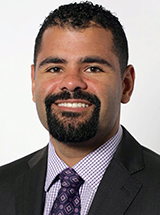 Niels D. Martin, MD, FACS, FCCM is the Chief of the Division of Traumatology, Surgical Critical Care, & Emergency Surgery at the University of Pennsylvania. He is also the Vice Chair for Diversity, Equity, & Inclusion for the Department of Surgery. He is the Program Director for the Traumatology & Surgical Critical Care Fellowships and is the Medical Director of the Trauma & Surgical Intensive Care Unit at the Penn Presbyterian Medical Center and the Organ Donor Management Center at the Hospital of the University of Pennsylvania.
Niels D. Martin, MD, FACS, FCCM is the Chief of the Division of Traumatology, Surgical Critical Care, & Emergency Surgery at the University of Pennsylvania. He is also the Vice Chair for Diversity, Equity, & Inclusion for the Department of Surgery. He is the Program Director for the Traumatology & Surgical Critical Care Fellowships and is the Medical Director of the Trauma & Surgical Intensive Care Unit at the Penn Presbyterian Medical Center and the Organ Donor Management Center at the Hospital of the University of Pennsylvania.
His research areas of expertise involve caring for critically injured and ill surgical patients. More specifically, he focuses on innovating clinical trials and outcomes research in clinical efficacy, quality, and safety. This focus includes trauma and surgical critical care populations with elements on end of life care, surgical futility, and organ donor management. He also had specific interest in surgical education as it relates to the training of the next generation of surgeons. In these endeavors, he has served as primary investigator in numerous clinical trials and performed extensive retrospective and prospective outcomes work. He has partnered with many collaborators including outside institutions, foundations, and industry. His work has been presented to numerous national & international organizations and published in a variety of prominent medical and surgical journals.
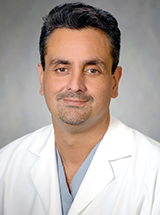 Jose Pascual is a professor of surgery and neurosurgery specialized in trauma and critical care who has a special interest in shock and head injury. His research interests are shared in translational and basic science investigation where he evaluates, through intravital microscopy, the real time microcirculation of the pia in live rodent brains after Traumatic Brain Injury (TBI). He seeks to learn how a variety of insults including head injury, shock and sepsis affect the brain and systemic microcirculation and how different management strategies influence these changes. This basic science work is translated into several clinical projects both retrospective and prospective, evaluating the effects of different neuroprotective agents and strategies in multi-injured and TBI patients across the Penn SICUs, the TSICU and NeuroICUs. He serves in multiple national and international research groups seeking to improve outcomes in polytrauma and traumatic brain injured patients as well as studying the immunemodulating effects of different resuscitation fluids and management strategies in different forms of shock.
Jose Pascual is a professor of surgery and neurosurgery specialized in trauma and critical care who has a special interest in shock and head injury. His research interests are shared in translational and basic science investigation where he evaluates, through intravital microscopy, the real time microcirculation of the pia in live rodent brains after Traumatic Brain Injury (TBI). He seeks to learn how a variety of insults including head injury, shock and sepsis affect the brain and systemic microcirculation and how different management strategies influence these changes. This basic science work is translated into several clinical projects both retrospective and prospective, evaluating the effects of different neuroprotective agents and strategies in multi-injured and TBI patients across the Penn SICUs, the TSICU and NeuroICUs. He serves in multiple national and international research groups seeking to improve outcomes in polytrauma and traumatic brain injured patients as well as studying the immunemodulating effects of different resuscitation fluids and management strategies in different forms of shock.
Jose Pascual’s research interests also include the dissemination of critical Illness management education utilizing high fidelity simulation. In the last 5 years, this has become heavily weighted out of the Simulation center and into the regular clinical hospital beds, spearheading the now monthly flash (unscheduled), bedside, in situ simulations that are lead and hosted by different groups across the health system (HUP, PPMC) across cardiac, heart & vascular, medical, neuro, trauma and surgical critical care units. Results of this education have been presented at national meetings and several published in peer reviewed journals.
 Patrick M. Reilly, MD, FACS is the C. William Schwab Professor of Surgery at the Perelman School of Medicine. He is the former Chief of the Division. He is past president of the Eastern Association for the Surgery of Trauma, past Vice-Chair of the American College of Surgeons’ Committee on Trauma, and the 2024 president of the American Association for the Surgery of Trauma. In more than 250 peer-reviewed publications, his research interests span the breadth of care for critically ill and injured patients, with a focus on trauma system performance.
Patrick M. Reilly, MD, FACS is the C. William Schwab Professor of Surgery at the Perelman School of Medicine. He is the former Chief of the Division. He is past president of the Eastern Association for the Surgery of Trauma, past Vice-Chair of the American College of Surgeons’ Committee on Trauma, and the 2024 president of the American Association for the Surgery of Trauma. In more than 250 peer-reviewed publications, his research interests span the breadth of care for critically ill and injured patients, with a focus on trauma system performance.
Dr. Reilly earned his undergraduate degree from the University of Notre Dame and his MD from Jefferson Medical College. He completed his general surgery residency at the Medical Center of Delaware and his fellowship in Trauma & Surgical Critical Care at Penn.
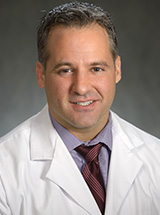 Dr. Seamon is recognized for his clinical experience and expertise in managing critically injured patients and has combined this experience with scientific data to produce evidence based guidelines that are utilized throughout the trauma world. Dr. Seamon currently serves as the Director of Education for the Division of Traumatology, Surgical Critical Care and Emergency Surgery. In this role, he has developed and managed an entire Divisional curriculum that includes lectures, journal clubs, performance improvement, interesting cases, video review, and research conference activities. Dr. Seamon has served as a clinical, research and career mentor for numerous fellows, residents and students. These mentor-mentee relationships have resulted in tremendous academic productivity.
Dr. Seamon is recognized for his clinical experience and expertise in managing critically injured patients and has combined this experience with scientific data to produce evidence based guidelines that are utilized throughout the trauma world. Dr. Seamon currently serves as the Director of Education for the Division of Traumatology, Surgical Critical Care and Emergency Surgery. In this role, he has developed and managed an entire Divisional curriculum that includes lectures, journal clubs, performance improvement, interesting cases, video review, and research conference activities. Dr. Seamon has served as a clinical, research and career mentor for numerous fellows, residents and students. These mentor-mentee relationships have resulted in tremendous academic productivity.
Dr. Seamon investigates the management of critical penetrating injuries and long-term outcomes after injury. He has led several multicenter scientific collaborations with trauma centers across the country and produced numerous regional, national international scientific presentations and original, peer-reviewed publications. He is a Director-at-Large on the Eastern Association for the Surgery of Trauma (EAST) Board of Directors and Chair of the EAST Manuscript and Literature Review Committee. Dr. Seamon serves as a peer reviewer for numerous surgical journals and is the EAST Editor of the Journal of Trauma and Acute Care Surgery and a member of the International Editorial Board for Injury.
 C. William Schwab is the Founding Chief of the Division of Traumatology, Surgical Critical Care, and Emergency Surgery at Penn. He is a past president of the Eastern Association for the Surgery of Trauma, the American Association for the Surgery of Trauma, and the International Association for Trauma Surgery and Intensive Care. In more than 250 peer-reviewed publications, Dr. Schwab has addressed numerous aspects of the care of critically ill and injured patients, including firearm injury, military medicine, and trauma system development.
C. William Schwab is the Founding Chief of the Division of Traumatology, Surgical Critical Care, and Emergency Surgery at Penn. He is a past president of the Eastern Association for the Surgery of Trauma, the American Association for the Surgery of Trauma, and the International Association for Trauma Surgery and Intensive Care. In more than 250 peer-reviewed publications, Dr. Schwab has addressed numerous aspects of the care of critically ill and injured patients, including firearm injury, military medicine, and trauma system development.
Dr. Schwab obtained his BA from Ithaca College and his medical degree from the State University of New York. He joined the US Navy during medical school, training and serving as a military surgeon during the Vietnam war, completing his residency at the Naval Regional Medical Center. He has served as a consultant or advisor to numerous governmental agencies including the Center for Disease Control, Departments of Defense, Health and Human Services, Transportation, and the National Academy of Medicine.
 Catherine (Kate) Sharoky, MD, MSCE is an Assistant Professor in the Division of Traumatology, Surgical Critical Care, and Emergency Surgery in the Department of Surgery at the University of Pennsylvania, Director of Performance Improvement for the Emergency Surgery Service, and Associate Program Director for the Fellowship in Traumatology and Surgical Critical Care. Her research focuses on using quantitative and qualitative methods to explore health disparities in emergency general surgery patient populations. She also focuses on health systems process improvement within emergency surgery. Dr. Sharoky completed her general surgery residency at Penn, and her surgical critical care fellowship at the University of Maryland Shock Trauma. She holds a Master of Science in Clinical Epidemiology with a concentration in Bioethics from the Perelman School of Medicine.
Catherine (Kate) Sharoky, MD, MSCE is an Assistant Professor in the Division of Traumatology, Surgical Critical Care, and Emergency Surgery in the Department of Surgery at the University of Pennsylvania, Director of Performance Improvement for the Emergency Surgery Service, and Associate Program Director for the Fellowship in Traumatology and Surgical Critical Care. Her research focuses on using quantitative and qualitative methods to explore health disparities in emergency general surgery patient populations. She also focuses on health systems process improvement within emergency surgery. Dr. Sharoky completed her general surgery residency at Penn, and her surgical critical care fellowship at the University of Maryland Shock Trauma. She holds a Master of Science in Clinical Epidemiology with a concentration in Bioethics from the Perelman School of Medicine.
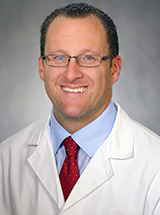 Dr. Adam M. Shiroff is currently an Associate Professor of Surgery and has become the founding Director of the Penn Center for Chest Trauma.
Dr. Adam M. Shiroff is currently an Associate Professor of Surgery and has become the founding Director of the Penn Center for Chest Trauma.
Dr. Shiroff’s principle interests are chest wall reconstruction after injury, trauma systems, emergency surgery and new business development. He actively participates in clinical research and engages in educational efforts from teaching elementary school age children about health and safety to lecturing attending surgeons at international meetings. Dr. Shiroff is a course director of multiple American College of Surgeon courses and actively participates in several national level trauma surgery organizations and functions on multiple committees. He has supported his local community though volunteer activities providing surgical support to county and state law enforcement during high risk operations. He is the president elect of the international Chest Wall Injury Society and has recently been asked to be the Editor of a medical text on chest trauma.
Clinically, his expertise is in trauma surgery, surgical critical care and emergency general surgery. He has become a nationally recognized expert in operative management of rib fractures and has taught the techniques of rib fracture fixation to surgeons from around the world. Dr. Shiroff is routinely referred cases to review and offers second opinions and solutions to rib fracture and chest wall injury patients across the country.

